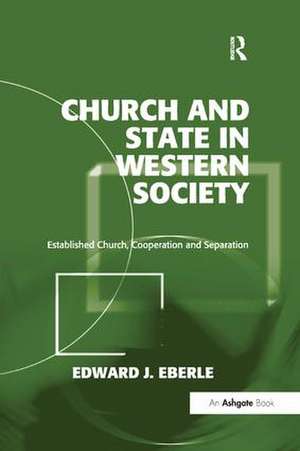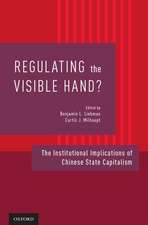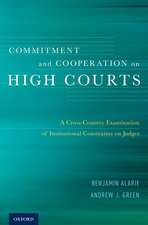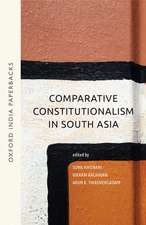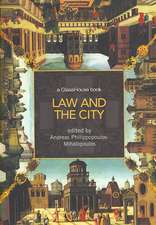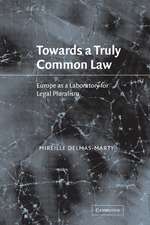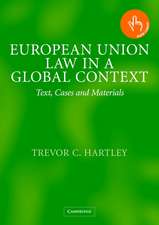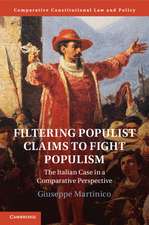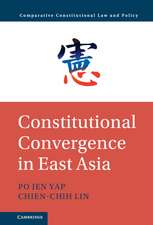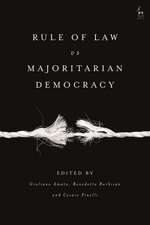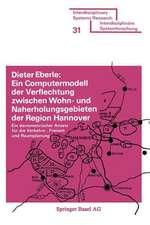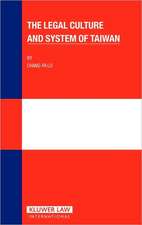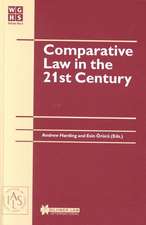Church and State in Western Society: Established Church, Cooperation and Separation
Autor Edward J. Eberleen Limba Engleză Paperback – 23 noi 2016
| Toate formatele și edițiile | Preț | Express |
|---|---|---|
| Paperback (1) | 489.26 lei 6-8 săpt. | |
| Taylor & Francis – 23 noi 2016 | 489.26 lei 6-8 săpt. | |
| Hardback (1) | 1057.09 lei 6-8 săpt. | |
| Taylor & Francis – 28 dec 2011 | 1057.09 lei 6-8 săpt. |
Preț: 489.26 lei
Nou
Puncte Express: 734
Preț estimativ în valută:
93.62€ • 97.56$ • 77.52£
93.62€ • 97.56$ • 77.52£
Carte tipărită la comandă
Livrare economică 03-17 aprilie
Preluare comenzi: 021 569.72.76
Specificații
ISBN-13: 9781138260856
ISBN-10: 1138260851
Pagini: 224
Dimensiuni: 156 x 234 x 12 mm
Greutate: 0.45 kg
Ediția:1
Editura: Taylor & Francis
Colecția Routledge
Locul publicării:Oxford, United Kingdom
ISBN-10: 1138260851
Pagini: 224
Dimensiuni: 156 x 234 x 12 mm
Greutate: 0.45 kg
Ediția:1
Editura: Taylor & Francis
Colecția Routledge
Locul publicării:Oxford, United Kingdom
Notă biografică
Edward J. Eberle is Professor of Law at Roger Williams University School of Law. He is the co-author of the casebook Comparative Constitutional Law (Lexis/Nexis, forthcoming) and author of Dignity and Liberty: Constitutional Visions in Germany and the United States (Praeger, 2001).
Recenzii
'The demarcation of the boundaries between state and religious communities has always been a sensitive matter in the West. Eberle's thorough treatment and comparative analysis of three of the principal models acceptable in the West - establishment, cooperation, and separation - serves as an important and timely contribution to the debate.' Larry Catá Backer, Pennsylvania State University, USA 'Professor Eberle's book is a tour de force that should be read by scholars, judges, attorneys, and others interested in the area of law and religion. He has the unique ability to compare complex court decisions regarding religion, from three nations, in a clear and interesting manner. His insights and analysis will be illuminating to all readers.' Mark S. Kende, Drake University, USA 'Church and State in Western Society deepens our understanding of German constitutional law, enriches our comprehension of American constitutional law, and enhances our knowledge of the constitutional law of the United Kingdom. Eberle’s fluency in the constitutional law of foreign nations has made him a trusted voice for those of us interested in comparative constitutional law, both in order to gain insights into other legal systems and to learn more about our own.' Journal of Church and State
Cuprins
Introduction; Chapter 1 History; Chapter 2 Basic Constitutional Text and Structure; Chapter 3 Personal Religious Freedom in the United Kingdom; Chapter 4 Personal Religious Freedom in Germany; Chapter 5 Personal Religious Freedom in the United States; Chapter 6 Church-State Relations in the United Kingdom; Chapter 7 Church-State Relations Germany; Chapter 8 Church-State Relations in the United States; Chapter 9 Comparative Observations;
Descriere
The role of religion as a contentious and motivating force in society is examined here through the lens of the church-state dynamic in countries with three very different approaches: the United Kingdom, the United States, and Germany. This book describes the components of each, illustrating their operation, examining their relative advantages and disadvantages, and delving deeply into relevant case law from all three countries in order to examine the development of their doctrines and to determine what, if anything, any of the models might learn from the others.
